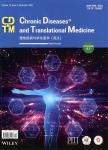Artificial intelligence:Neural network model as the multidisciplinary team member in clinical decision support to avoid medical mistakes
Artificial intelligence: Neural network model as the multidisciplinary team member in clinical decision support to avoid medical mistakes作者机构:Interventional Cardiology 1 Department GBUZ Republic Heart Centre Ufa Russia Bashkir State Medical University Ufa Russia c GBUZ Republic Heart Centre Ufa Russia
出 版 物:《Chronic Diseases and Translational Medicine》 (慢性疾病与转化医学(英文版))
年 卷 期:2016年第2卷第3期
页 面:-页
学科分类:081203[工学-计算机应用技术] 08[工学] 0835[工学-软件工程] 0812[工学-计算机科学与技术(可授工学、理学学位)]
主 题:Coronary artery bypass grafting Percutaneous coronary intervention Artificial intelligence Decision making
摘 要:Objective: The continuous uninterrupted feedback system is the essential part of any well-organized system. We propose aLYNX concept that is a possibility to use an artificial intelligence algorithm or a neural network model in decision-making system so as to avoid possible mistakes and to remind the doctors to review tactics once more in selected cases. Method: aLYNX system includes:registry with significant factors, decisions and results;machine learning process based on this registry data;the use of the machine learning results as the adviser. We show a possibility to build a computer adviser with a neural network model for making a choice between coronary aortic bypass surgery (CABG) and percutaneous coronary intervention (PCI) in order to achieve a higher 5-year survival rate in patients with angina based on the experience of 5107 patients. Results: The neural network was trained by 4679 patients who achieved 5-year survival. Among them, 2390 patients underwent PCI and 2289 CABG. After training, the correlation coefficient (r) of the network was 0.74 for training, 0.67 for validation, 0.71 for test and 0.73 for total. Simulation of the neural network function has been performed after training in the two groups of patients with known 5-year outcome. The disagreement rate was significantly higher in the dead patient group than that in the survivor group between neural network model and heart team (16.8%(787/4679) vs. 20.3%(87/428), P ? 0.065)) Conclusion: The study shows the possibility to build a computer adviser with a neural network model for making a choice between CABG and PCI in order to achieve a higher 5-year survival rate in patients with angina.



